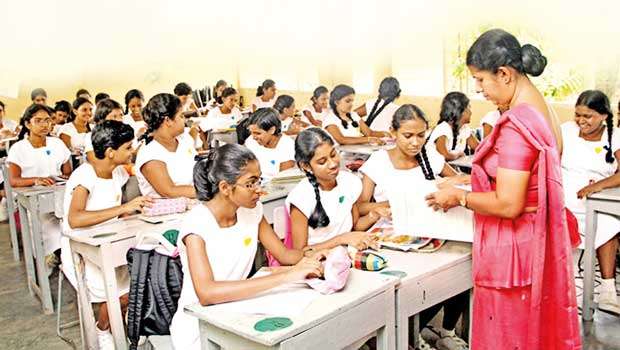Reply To:
Name - Reply Comment

Education is not to be treated as an abstract idea or a theory or philosophy. It’s a life-long process and is something related to the actual experience of life. It should aim ultimately to equip a young man or woman with such qualities of character as to enable him to face the day to day challenges in society.
The primary aim of education is to help the children grow up to be men and women with a total development of their personalities. While being children, they must be  helped to develop all elements that go to form the personality. They must be given guidance to maintain a balance among these elements. There is a general agreement that a fundamental aim in education should be the development of intelligence. Intelligence is that which brings balance, harmony, beauty and proportion to life.
helped to develop all elements that go to form the personality. They must be given guidance to maintain a balance among these elements. There is a general agreement that a fundamental aim in education should be the development of intelligence. Intelligence is that which brings balance, harmony, beauty and proportion to life.
J. Krishnamurthy, an eminent Indian philosopher, in his book on “Intellect, Authority and Education” says, “It is clear that merely to cultivate the intellect, which is to develop the capacity or knowledge does not result in intelligence. Intelligence is not something related only with reason but also with feeling.”
What Krishnamurthy wanted to convey is that generally intelligence is considered to be something related to human brain and the intellect. The feeling is totally eliminated. Therefore an intelligent man is the one who is developed intellectually and emotionally.
Thus the physical, intellectual, emotional and moral development of an individual is the broad definition of the fundamental aim of education. (Learning to be, a UNESCO publication)
There is a general agreement that a fundamental aim in education should be the development of intelligence. Intelligence is that which brings balance, harmony, beauty and proportion to life
If education aims at the development of the physical and intellectual aspect of the child, neglecting his aesthetic, moral and spiritual aspect is not a total education and it will not produce individuals with totally developed personalities.
Therefore the schools must provide opportunities for the child to strengthen his growing body, his skills, to train the nerves and muscles, to teach him good hygienic and dietary habits, and above all to struggle and resist the temptation offered to him to destroy his moral personality by modern society in the form of alcohol, drugs, sex etc.
The child should be helped through education to understand that self-confidence, emotional balance, aesthetic enjoyment are all dependent upon the harmony, health and the vitality of the body.
The role of a teacher is very vital for the success of any educational system. But today, the teacher’s role has assumed a new form and meaning. There were times in which teachers were considered as those who imparted knowledge, who store the pupil’s brain with information.
The pupils were receptors of this information in a passive manner without any active involvement in the learning process. At times it was considered irreverent to ask question from teachers.
Therefore an autocratic social climate prevailed throughout the classroom which was not at all conducive to a child’s total development. But in the modern educational system the teachers assume a new role. They are no longer ones who impart knowledge.
They are the ones who partake in the process of learning, along with the child. Today’s education is a child-centred one in which the whole attention is focused on the child.
Teachers must back every effort to arouse the spirit of inquiry in the child by relating the environment to academic work. Children must be encouraged to discuss by themselves, various aspects related to their lives, personality and environment. In this task the teacher acts as a stimulus.
The teacher must create in the child the love for nature and must help the child to find delight in beauty that nature had created. Moral development of the child should engage the primary attention of the teacher. Their conduct must be exemplary and they must love the children with a spirit of understanding.
The teacher’s task especially in a developing country like Sri Lanka with a traditional culture, is of great responsibility. Today’s children are open to a number of educative influences and TV, radio, internet, DVDs, social media etc have tremendous impacts in shaping the attitude of children to life, world and their
immediate environment.
The teacher’s task is to study these factors from which children imbibe their values and relate it to formal education in such a way that they may not find a conflict or confusion between what is taught in the school and what they learn from the environment.
Thus, today the teachers cannot claim to have the monopoly of education. They are co-ordinators of educative influences. It is said, “Ages of changes are ages of conflict.”
Today our country and society are on the verge of great changes and upheavals. Traditional values are being threatened by the values that are being propagated through the mass media.
The children are bound to be affected and influenced by all these forces of social changes. They are bound to encounter mental confusion. It is the duty of a teacher to understand the emotional problems of the children generated by these social changes and to liberate them from such mental confusion. The teacher must create in them values that are beneficial to the individual and society. They must broaden their outlook and provide them with noble ideals.
I wish to conclude this article with a passage in “Towards Relevance in Education” (Bogoda Premaratne Report of the Educational Reform Committee, 1979; p.130)
“The teachers can no longer consider themselves as dispensers, rather, they are sharers of knowledge. They do not lord it over their class. Humble and willing to learn through professional training and from their pupils, they will go with them hand in hand as an adventure”.